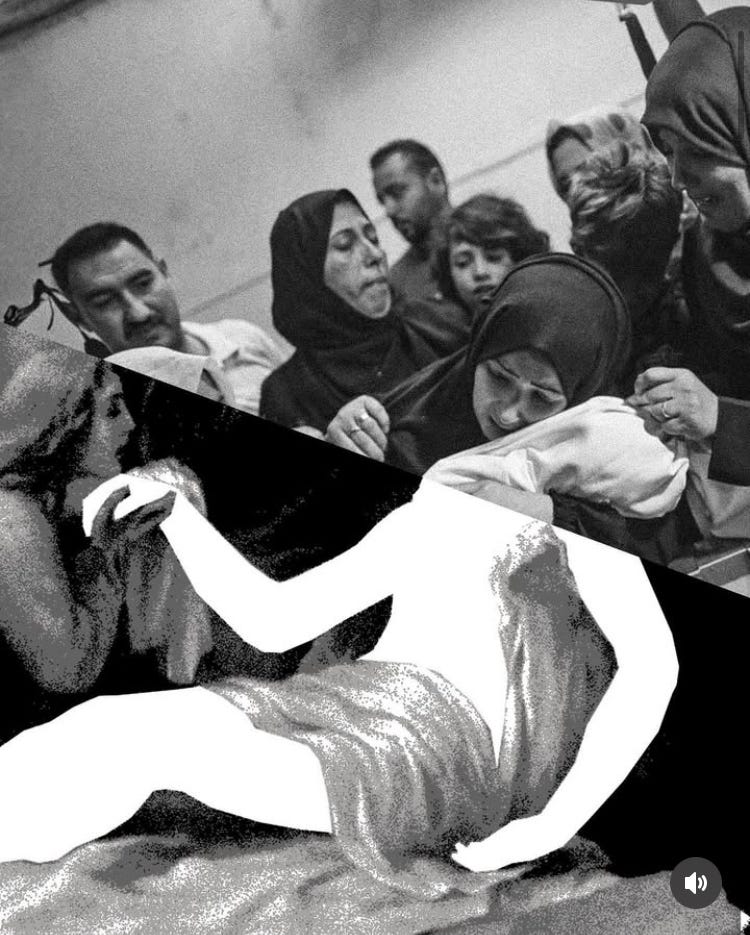New Empire: A Revisited Poem Cycle for Holy Week
Holy Saturday hits different this year.

Good Friday and Easter get the attention, but Holy Saturday still has me in all its humanness and liminality. For Christians who observe Holy Week, every day has a dramatic story. But today is like a pause between the notes, the beat of rest between two high holy days.
For some, today is something of a high holy day in the American mythos too. It’s the 250th anniversary of the Battle of Lexington and Concord1, the start of the American Revolution. I find it hard to care about American war holidays anymore, but there’s something in this contrast I can’t shake. The day that Christians honor God becoming powerless before overpowering death is coinciding with a day that, unknown to those soldiers 250 years ago, planted the seeds of a future empire.2
For me, one of the most transformative perspective shifts has been learning to see how Jesus’ life and teachings confront and confound our notions of power. Five or so years ago, I shared a little Holy Week poem cycle on my old blog, and I wanted to clean them up and republish them here. Each small poem is a reflection on a story from the Holy Week narrative through that lens.3
I put them in a little pdf with some iconography and classical artwork, if you like the combination of reading and visuals. I’ll also include all the poems in text form below for those who need/prefer that format.
Happy Easter Eve. The last enemy to be destroyed is death. May you find peace in the waiting and hope in the coming dawn. 🌷
New Empire: A Holy Week Poem Cycle
I. The Arrival Behold your new king — not striding in with sword and shield, and ten thousand men, scowling down from a war horse. Behold the Kingdom comes to you, quietly riding on a borrowed mule. II. The Cleansing Even the glow of the holiest house can be dulled with the dust of greed. But listen — a shout, the crack of cage and whip, and a King reclaiming what is rightfully his. III. The Dilemma Rabbi says give Caesar his due — coins, roads, power, borders to defend, wealth to be eaten by moths and rust. And what is God’s? Fields, forests, oceans, galaxies. Nothing to monetize, somehow everything. IV. The Gift She wept like she knew what was coming, like someone who’d seen death itself reverse. Some called it a waste, but she’s done a beautiful thing, a burial anointing fit for a king. V. The Washing Before the cleared plates, the sword’s clatter the silver’s clink, he did not call to arms. but to the floor, to wipe away the dust of a long journey from their tired soles. VI. The Accusing In the face of violence, his silence was the only answer, his blood and resolve the only example, his final breath a resounding protest to the empires that crush what they cannot own. VII. The Resting While his friends mourn the revolution lost, the King waits silent behind stone. How could they know his rest was spent wrestling, resisting, Death — that old tyrant even Caesar himself could never escape. VIII. The Dawning Mary weeps in the garden, through tears asks, “Where is he?” He whispers her name. and she hears the quiet coming of a new empire where even the lowest are named by Love.
Full Disclosure: I can only remember this fact because it’s a legit state holiday in Massachusetts. The Commonwealth rides hard for revolutionary history.
Gosh I want to write SO MANY words about this, but this post is long enough, so let’s just have poems today. Call it my little Create to Liberate contribution. ;)
Nerdy form and inspiration notes: I’m playing with on a medieval form of 33 word devotional poetry that I learned about from Andrew Roycroft years ago. And I am indebted to Brian Zahnd’s writing on this topic and wish I could find his old “Christ Contra Empire” Twitter post that sparked this series.


